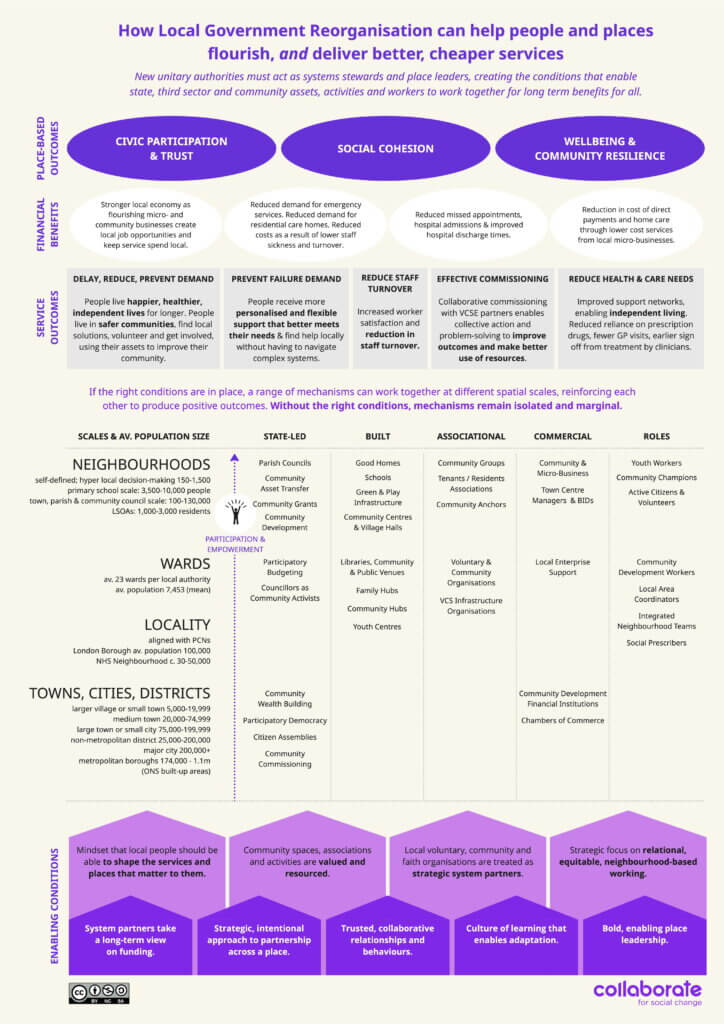With the appointment of a new minister, MHCLG has an opportunity to refocus reorganisation and make sure it achieves the impact the effort deserves.
A version of this article was originally published in The MJ on 16 September.
Local government reorganisation (LGR) offers a once in a lifetime opportunity to transform what councils do, how they do it and who it benefits. It comes at a moment when trust in public services is low, demand is rising and resources are overstretched. It’s also a potentially fleeting opportunity that stands every chance of being missed. At its worst we will end up with organisations with slightly different names, operating at bigger footprints, even further removed from local communities, doing the same old things in the same old, broken way.
This can’t be about doing the same things slightly better, it needs to be seen as a chance to do better things. A chance to build councils that are closer to communities, more effective and financially sustainable. The Government re-shuffle could create the time and opportunity to address this.
We know what doesn’t work, and what wrongs need to be righted. Transactional service models based on new public management are fragmented, dehumanising and inefficient. Decades of having to ‘do more with less’ has hollowed out services, increased thresholds for support, stripped away opportunities for early intervention and prevention and decimated social infrastructure. There’s a growing level of dissatisfaction, with many people feeling that vital public services don’t meet their expectations. This is felt most acutely in those places that have the least, highlighting entrenched geographic and social inequalities and driving division.
LGR is a chance for a fundamental reset. Our report sets out why it’s vital to take the great practice happening at the margins and move it into the mainstream, by embedding it within the operating model, culture and practice of new unitary authorities. To unlock the deep local insight, energy, assets and ideas that exist in neighbourhoods, and consolidate that into business as usual.
It adds to the rising sense of dissatisfaction and loss of trust in public services, the institutions that provide them and the politicians in charge. Services that fail to improve people’s lives are not efficient, even if they cost less to deliver.
There is a better way. Collaborate’s recent report The Bigger You Go, the Less You Know written with Test Valley Borough Council, shows that place-based, relational approaches – working at scales people identify with, focusing on relationships, empowerment and prevention – can deliver better results, as well as delay, reduce and prevent demand.
There is a growing movement towards a focus on neighbourhoods as an ‘engine of change’. A movement towards councils recognising that health and wellbeing is generated within connected communities and working alongside citizens to build community capacity and capability; and by co-locating services to work together at a hyper-local scale.
There are examples of this practice happening from Andover to Wigan. It’s not new. But despite their proven promise these approaches tend to remain marginal, often struggling to get the widespread support, investment or attention needed to be sustained or expanded beyond the pilot phase, or to survive political shifts. As a council officer once told me ‘innovating in local government is like trying to change the wheel while you’re still driving the car’.
LGR is a chance for a fundamental reset. Our report sets out why it’s vital to take the great practice happening at the margins and move it into the mainstream, by embedding it within the operating model, culture and practice of new unitary authorities. To unlock the deep local insight, energy, assets and ideas that exist in neighbourhoods, and consolidate that into business as usual.
To do this requires a shift in how the LGR process is being approached – rather than a structural, procedural ‘reorganisation’, it is an opportunity for ‘redesign’ with civic purpose and collaborative culture prioritised over structure. New unitaries must be organisations fit for the 21st century, agile enough to respond to the complexity of today’s challenges, rather than adaptations of past bureaucracies.
We know that better social outcomes are not ‘delivered’ by single projects, programmes or organisations, but are the result of many people, organisations, processes and communities acting together as a system. It feels vital that government ministers recognise new ‘fit for purpose’ councils need to be designed with learning, adaptation and collaboration at their core.
Proposed new unitaries need to reframe their purpose, looking beyond ‘done to’ service delivery to put people and communities at the heart of the change they are working to create. And understand that the role they play within their place should be as an enabler of others, as place leaders capable of convening and connecting local partners, people and organisations to address common challenges.
It is only by creating the conditions that enable all the organisations, individuals, assets and activities in a place to work together that they will unlock long term benefits for all – healthier, happier people, better connected and more resilient communities, services that actually help – and that are more cost effective to deliver.
This is the chance for the true transformation many have been calling for – let’s not lose sight of the size of the prize in the speed and procedural demands.
Want to find out more about this work? Email [email protected] to reach Jenni Lloyd.

Read the full report the bigger you go the less you know or peruse our blog sharing how the diagram above evolved with input and feedback .
